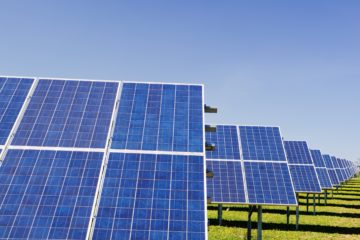Are you interested in understanding how blockchain technology will democratize investment in the renewable energy sector? Many investors are in the process of selling their fossil fuel investments (stocks and bonds of oil and gas companies) and reallocating to the renewable energy sector. There are three main reasons for this trend. First, the majority of people in the world acknowledge that we must take more action to reduce greenhouse gas emissions and fight climate change. Second, solar investment offers high returns with relatively low risk, vs. other investments. This is due to the dramatic decline in solar panel costs during the past decade and the fact that most solar investments involve a 20-year contract with a credit-rated offtaker (buyer of electricity) such as an electric utility, municipality or Fortune 500 company. That makes a solar investment very similar to a bond with a very high yield-to-maturity. The third driver is an overall desire to engage in socially responsible investment, also known as impact investment. People are increasingly making investment decisions based on their values and ethics. Investing in solar offers a high return combined with a socially responsible investment (SRI) component.
Investing in solar assets has generally been restricted to large institutional investors such as pension funds, family offices, private equity groups or large electric utilities, which usually make investments in large utility-scale solar projects. Think of a giant solar field on 100 acres. Retail investors seeking exposure to the renewable energy sector have been thus far limited to investing in the stocks of companies which either manufacture solar panels or operate as a Yieldco. A yield co is a company that is formed to own operating assets that produce a predictable cash flow, primarily through long term contracts. Unfortunately, investment in upstream solar (meaning the companies that actually manufacture the equipment) tends to be low margin and offers limited returns as the industry has been commoditized. Yieldcos offer limited control because investors cannot choose which projects they can invest in, but instead invest blindly in a basket of low-yielding assets because Yieldcos generally invest in larger, low-return renewable energy projects.
Sun Fund is developing an investment platform that will allow individual investors to make a fractional (very small) investment in a large project. For example, if a 1 megawatt solar project costs $2 million to develop and build, Sun Fund’s Producer-to-Investor Platform will allow anyone to invest as little as $100 into that project and receive their proportional return over a long period of time – usually 20 years.
Sun Fund is committed to driving investment into renewable energy by using blockchain technology. We are developing a Producer-to-Investor Platform (the PIP) which will accelerate investment into the renewable energy sector by tokenizing renewable energy assets. The platform is based on distributed ledger technology, which will allow us to develop an immutable record of a renewable energy asset’s performance.
Our platform concept is globally scalable. We are planning to beta test our blockchain investment platform here in the United States and then begin to expand into select emerging markets. Please view our offer at https://www.startengine.com/sun-fund-dc to learn more.

